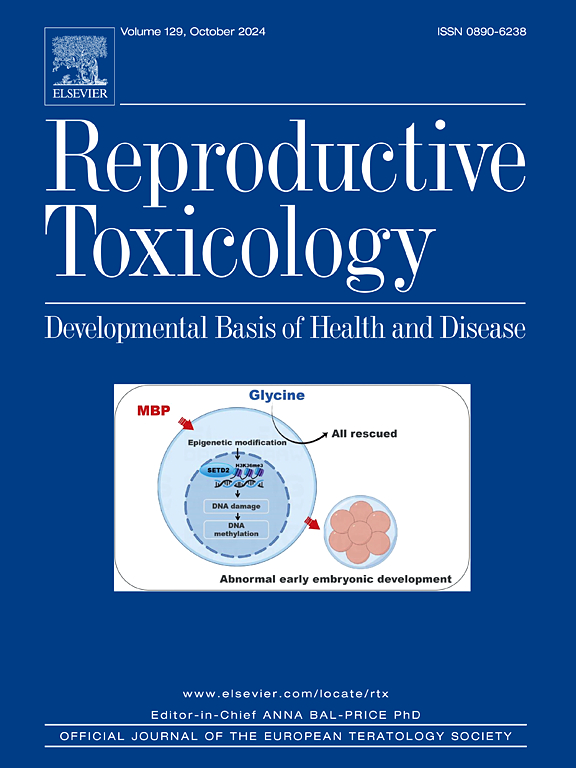Antidepressant aripiprazole induces adverse effects on neural development during cortex organoid generation
IF 3.3
4区 医学
Q2 REPRODUCTIVE BIOLOGY
引用次数: 0
Abstract
A significant number of women experience anxiety and depressive symptoms during pregnancy, leading to the prescription of antidepressants, including aripiprazole. However, although a few animal studies have reported its developmental toxicity, there is a lack of research on the potential risks aripiprazole may pose to the fetus, particularly regarding neural development, as well as an absence of appropriate models to verify these effects. Therefore, this study investigates the impact of aripiprazole on neural development using cortex organoids, which can effectively model human brain development and function while overcoming interspecies differences. Cortex organoids were generated and exposed to aripiprazole at concentrations of 0.3–9 µM over 4 weeks. We assessed morphological changes, cell viability, gene expression, immunofluorescence staining, and electrophysiological function. The results revealed that aripiprazole led to significant reductions in organoid size and increased cell death, particularly at higher concentrations. Immunofluorescence analysis showed abnormalities in the expression patterns of neural stem cells and neuronal markers. Additionally, real-time PCR demonstrated decreased expression of genes related to neural stem cells, neural differentiation and migration, maturation, synaptogenesis, and gliogenesis, along with increased apoptosis-related gene expression. Electrophysiological recordings indicated impaired neural activity, evidenced by reduced mean firing rates. Our study is the first to demonstrate that aripiprazole induces adverse effects on neural development across functional, molecular, and morphological aspects. The findings will aid in a better understanding of the risks associated with antidepressant use during pregnancy in terms of neural development and suggest that cortex organoids are a valuable model for evaluating potential neurodevelopmental toxicants.
抗抑郁药阿立哌唑对皮质类器官生成过程中的神经发育有不良影响。
相当多的妇女在怀孕期间经历焦虑和抑郁症状,导致处方抗抑郁药,包括阿立哌唑。然而,尽管有一些动物研究报道了阿立哌唑的发育毒性,但缺乏关于阿立哌唑可能对胎儿造成的潜在风险的研究,特别是在神经发育方面,也缺乏适当的模型来验证这些影响。因此,本研究通过皮质类器官来研究阿立哌唑对神经发育的影响,皮质类器官可以有效地模拟人类大脑的发育和功能,同时克服物种间的差异。生成皮质类器官,并将其暴露于浓度为0.3-9µM的阿立哌唑中4周。我们评估了形态学变化、细胞活力、基因表达、免疫荧光染色和电生理功能。结果显示,阿立哌唑导致类器官大小显著减少和细胞死亡增加,特别是在较高浓度下。免疫荧光分析显示神经干细胞和神经元标记物的表达模式异常。此外,实时PCR结果显示,与神经干细胞、神经分化和迁移、成熟、突触发生和胶质瘤发生相关的基因表达减少,与凋亡相关的基因表达增加。电生理记录显示神经活动受损,平均放电率降低。我们的研究首次证明了阿立哌唑在功能、分子和形态学方面对神经发育产生不利影响。这些发现将有助于更好地了解怀孕期间使用抗抑郁药对神经发育的影响,并表明皮质类器官是评估潜在神经发育毒性的有价值的模型。
本文章由计算机程序翻译,如有差异,请以英文原文为准。
求助全文
约1分钟内获得全文
求助全文
来源期刊

Reproductive toxicology
生物-毒理学
CiteScore
6.50
自引率
3.00%
发文量
131
审稿时长
45 days
期刊介绍:
Drawing from a large number of disciplines, Reproductive Toxicology publishes timely, original research on the influence of chemical and physical agents on reproduction. Written by and for obstetricians, pediatricians, embryologists, teratologists, geneticists, toxicologists, andrologists, and others interested in detecting potential reproductive hazards, the journal is a forum for communication among researchers and practitioners. Articles focus on the application of in vitro, animal and clinical research to the practice of clinical medicine.
All aspects of reproduction are within the scope of Reproductive Toxicology, including the formation and maturation of male and female gametes, sexual function, the events surrounding the fusion of gametes and the development of the fertilized ovum, nourishment and transport of the conceptus within the genital tract, implantation, embryogenesis, intrauterine growth, placentation and placental function, parturition, lactation and neonatal survival. Adverse reproductive effects in males will be considered as significant as adverse effects occurring in females. To provide a balanced presentation of approaches, equal emphasis will be given to clinical and animal or in vitro work. Typical end points that will be studied by contributors include infertility, sexual dysfunction, spontaneous abortion, malformations, abnormal histogenesis, stillbirth, intrauterine growth retardation, prematurity, behavioral abnormalities, and perinatal mortality.
 求助内容:
求助内容: 应助结果提醒方式:
应助结果提醒方式:


